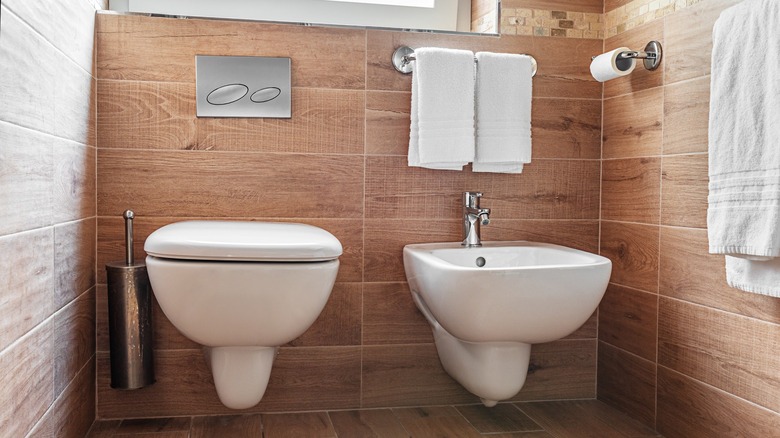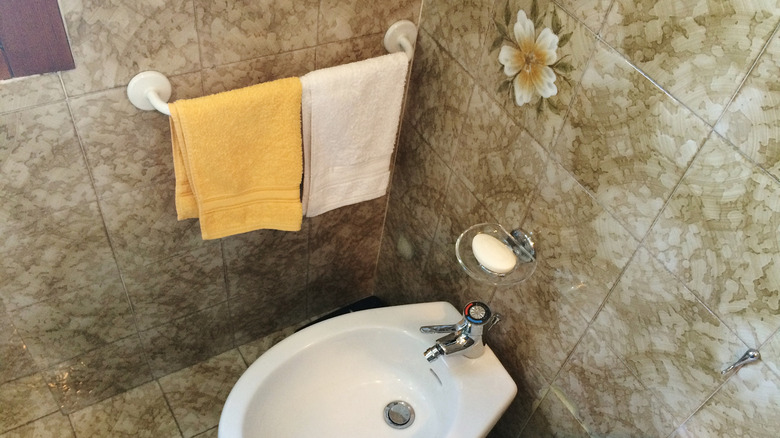The Unspoken Towel Rule Tourists Visiting Italy Really Need To Know About
Italy is rich in history, art, and cuisine, but some cultural nuances may perplex the uninitiated tourist. A few of these concern the bathroom, or "bagno" in Italian. One bizarre thing tons of toilets in Italy don't have is a toilet seat, but one thing they do have is an unspoken towel rule. Hint: It has to do with bidets.
In many Italian bathrooms, you'll find a trio of towels, each with its own purpose. First, there's the largest towel, meant for drying your body after a shower or bath. Then, the medium-sized towel, intended for drying your hands and face. Lastly, and perhaps most importantly for cultural etiquette, the smallest towel, which is often located near the bidet. This towel is not meant for the face or hands. You can probably guess why ...
Although its origins are vaguely French, the bidet is a fixture commonly found in Italian bathrooms, used for washing your intimate bits after going to the bathroom. Napoleon used the bidet religiously and had a custom one made from silver, which he took with him everywhere he traveled (he then gifted it to his son in his last will and testament).
A 1975 law requires all Italian homes to have at least one bidet. Clearly, these porcelain "cobs" are no laughing matter in Italy. Bidets are also quite nifty beyond the nether region: bathing babies, keeping beer cold, or doing laundry are some other unique alternative functions. However, the towel next to the bidet has one and only one function.
The bidet and the bidet towel
The small towel placed near the bidet is specifically designated for drying oneself after using this fixture. Nothing else. To the untrained eye, this nifty little towel might seem like a convenient hand towel, but using it as such will be quite the faux pas — not to mention a hygienic disaster. Likewise, do not use the hand towel as a bidet towel.
If you're staying in an Italian hotel, there will likely be a dedicated towel hanging next to the bidet. Use it correctly — one per guest! However, if you are visiting someone's house and see a little towel next to the bidet, do not use it. It's a private one. If the host didn't provide a personal bidet towel for guests, use toilet paper to dry off after the bidet.
You may also find something called "sapone intimo" or "detergent intimo" near the bidet. This is a type of gentle soap that you can use for your private bits while using the bidet. In Italy, there's a not-so-secret consensus that people who don't use a bidet are a little dirty. Thus, the bidet, soap, and towel trio is the holy trinity of the Italian WC.
All of this might seem strange or daunting, but this is essential toilet info you need to know before visiting Italy. Embrace the opportunity to learn and adapt to local customs. It will only enhance your travel experience and make going to the bagno a little more fun and clean.
Embracing Italian toilet customs
For tourists, the key to avoiding this cultural misstep is to observe and follow the towel placements as intended by your hosts or the hotel. If in doubt, remember the general rule of thumb: the smallest towel, often distinctively placed near the bidet or marked by a different color or pattern, should not be used for drying the hands or face. When staying in a private home, if you're unsure which towel to use, it's perfectly acceptable to ask your hosts to clarify.
Remember that this isn't exclusive to Italy; many other countries have similar practices regarding towel usage and bathroom etiquette. France, Spain, and Portugal in Europe, Japan in Asia, and Argentina and Venezuela in South America all commonly have bidets in the washrooms. In these countries and more, bidets are a part of daily life. The most important thing to remember is to follow the unspoken towel rule.
Using a bidet is more hygienic than toilet paper alone, as water and soap clean much more thoroughly. Bidets are also more environmentally friendly, as they significantly reduce the need for toilet paper. The average American uses 141 rolls of toilet paper per year! Regular bidet use can even help with various health conditions, including urinary tract infections and constipation. Furthermore, bidets can also help reduce the likelihood of clogged pipes and septic tanks. Maybe the Italians are onto something; after all, who wouldn't like a little wash — it's a washroom, isn't it?

